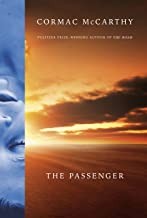norb ha recensito The Passenger di Cormac McCarthy
Cormac McCarthy Writes a Cormac McCarthy Book
4 stelle
What a strange book. Many questions posed, few answered. Conversations that you have to follow on your own. Punctuation optional. If you don't like how thick McCarthy's writing can get, you definitely do not want to read this one. I found that I could only handle a chapter (or less) at a time because I had to think so hard and pay attention to what was going on. I re-read many lines to try to understand them. Re-read entire passages to figure out who was actually speaking.
I've read a number of other McCarthy books, so I knew what I was getting into, vocabulary wise. I think as you get used to his style it gets easier to read, though.
A lot of philosophical ideas presented in the conversations between the main character and his cast of "friends." Western's role in the story felt more like a sponge …
What a strange book. Many questions posed, few answered. Conversations that you have to follow on your own. Punctuation optional. If you don't like how thick McCarthy's writing can get, you definitely do not want to read this one. I found that I could only handle a chapter (or less) at a time because I had to think so hard and pay attention to what was going on. I re-read many lines to try to understand them. Re-read entire passages to figure out who was actually speaking.
I've read a number of other McCarthy books, so I knew what I was getting into, vocabulary wise. I think as you get used to his style it gets easier to read, though.
A lot of philosophical ideas presented in the conversations between the main character and his cast of "friends." Western's role in the story felt more like a sponge for pain than an actual part of the plot. He seems to move along without much driving him, outside of avoiding something or someone or somewhere. There isn't much there there, when it comes to him. The real interesting characters are those around him. If you want a hero, he is not that. If you want a vessel for yourself, then you're on to something.
There were times that I felt like McCarthy was speaking directly to the reader. Times where he seems to apologize that the story isn't what we expect. Maybe even times where he talks down to us. Does Cormac McCarthy secretly hold a doctorate in mathematics or physics? He clearly has an idea who shot Kennedy.
Would I say this was as good as The Road? No. Suttree? Maybe. Better than Child of God, IMHO. A book I could see myself coming back to in 10 years and finding new things to learn. I enjoyed the challenge, which I always do with McCarthy's books.


